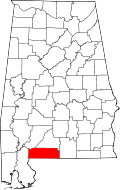Brewton, Alabama | |
|---|---|
 Brewton Commercial Historic District | |
 Location of Brewton in Escambia County, Alabama | |
| Coordinates: 31°7′3″N87°4′16″W / 31.11750°N 87.07111°W | |
| Country | United States |
| State | Alabama |
| County | Escambia |
| Area | |
• Total | 11.53 sq mi (29.87 km2) |
| • Land | 11.30 sq mi (29.26 km2) |
| • Water | 0.24 sq mi (0.61 km2) |
| Elevation | 82 ft (25 m) |
| Population (2020) | |
• Total | 5,276 |
| • Density | 467.1/sq mi (180.33/km2) |
| Time zone | UTC−6 (Central (CST)) |
| • Summer (DST) | UTC−5 (CDT) |
| ZIP Code | 36426-36427 |
| Area code | 251 |
| FIPS code | 01-09208 |
| GNIS feature ID | 0157900 [2] [ needs update ] |
| Website | http://www.cityofbrewton.org/ |
Brewton is a city in and the county seat of Escambia County, Alabama, United States. As of the 2020 census, the 2020 population was 5,276. Brewton is located in south central Alabama, just north of the Florida Panhandle.
Contents
- History
- Geography
- Climate
- Demographics
- 2020 census
- 2010 census
- Former Town of Alco (c1885/1888-1897)
- Historic Demographics
- Government
- Culture and special events
- Notable people
- Historic sites
- Transportation
- References
- Notes
- References 2
- External links
Brewton was home to the Downing Industrial School, a school for girls. Brewton was ranked as one of the 100 best small towns in America in Norman Crampton's book, The 100 Best Small Towns in America (1995). [3]





